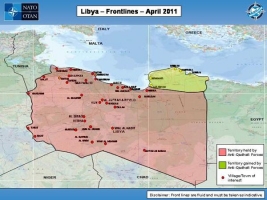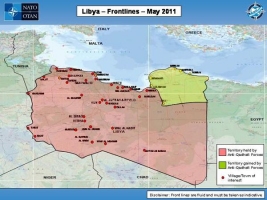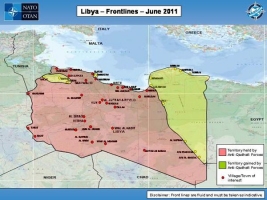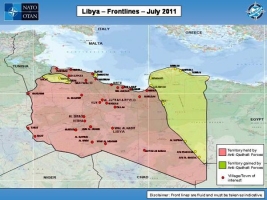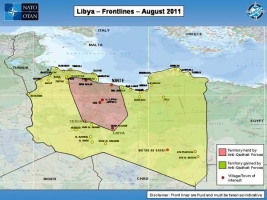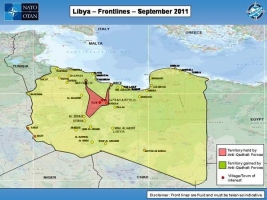Libya Civil War (2011)
| Daily News Updates | ||||||
|---|---|---|---|---|---|---|
| October | ||||||
| September | ||||||
| August | ||||||
| July | ||||||
| June | ||||||
| May | ||||||
| April | ||||||
| March |
Muammar Gadhafi had ruled Libya for more than 40 years by banning and brutally opposing any individual or group opposing the ideology of his 1969 revolution, criminalizing the peaceful exercise of expression and association, refusing to permit independent journalists' and lawyers' organizations, and engaging in torture and extrajudicial executions, including the 1,200 detainees killed in Abu Salim Prison in June 1996. Libya took formal responsibility for the terrorist attack that brought down Pan Am Flight 103 over Lockerbie, Scotland, killing 270 people, 189 of whom were U.S. citizens and high-ranking Libyan officials indicated that Muammar Gadhafi personally ordered the attack.
The demands of the Libyan people began much like those of their neighbors in North Africa and the Middle East--for the protection of their universal rights, for greater political freedom and representative government, for justice and opportunity. But the response of Qadhafi and those still loyal to him stood in stark contrast to the inspiring events of what some called the Arab spring. Qadhafi unleashed a merciless campaign of violence against the Libyan people, including civilian noncombatants, using every tool at his disposal, from artillery barrages, to airstrikes, to the employment of foreign mercenaries.
On February 16, 2011 Libyan protesters clashed with police in an anti-government demonstration inspired by the uprisings that brought down the rulers of Libya's neighbors, Egypt and Tunisia. Opposition activists, organizing through social media, rallied against the country's long-time leader, Moammar Gadhafi, in the country's second-biggest city, Benghazi. Local media reports say protesters threw stones at police, who fired rubber bullets to contain the crowds. Hospital officials said 38 people were injured in the clashes. On 17 February 2011 at least 12 people were killed on Thursday and dozens injured in anti-government protests in Libya's northeastern city of Al-Baida and eastern city of Benghazi. Inspired by popular uprisings in Egypt and Tunisia, Libyan protesters also called for a "Day of Rage" in a bid to challenge the 41-year rule of Colonel Muammar Qadhafi, who had been accused of human rights abuses.
Clashes between supporters and opponents of Moammar Gadhafi were reported in Tripoli, Libya's capital, Sunday February 20, 2011 as the Libyan leader tried to squelch the uprising against his 41-year rule. Witnesses in Libya's second-largest city, Benghazi, saidthat some military personnel there had switched sides and joined the anti-government demonstrators in the city, where security forces reportedly shot and killed scores of protesters over the past week. The U.S.-based rights group Human Rights Watch said Libya's death toll from five days of unrest had risen to at least 173. Sources at hospitals in Benghazi said the crackdown there had killed at least 200 people and wounded hundreds of others. Riots were largely centered in the eastern cities of Benghazi, Bayda and Tobruk, but there are reports that unrest was spreading to the west of the country.
Reports from the Libyan capital, Tripoli, said helicopters and warplanes struck parts of the city 21 February 2011, but Mr. Gadhafi's son, Saif al-Islam Gaddafi, said the planes had only hit ammunition dumps. Witnesses in Tripoli gave multiple accounts of armed African mercenaries opening fire on protesters. Two residents said they saw African soldiers deplane from military transport flights at an airbase near the capital. Residents said crowds of pro-Gadhafi supporters took over Tripoli's Green Square after truckloads of militamen had arrived and opened fire on anti-regime demonstrators. Reports indicated up to 500 people could have been killed by government forces since protests began and thousands more had been wounded.
By February 23, 2011 a massive evacuation of foreigners from Libya was underway by air, sea and land. Tens of thousands of foreigners in Libya are boarding planes, ships and, in some cases, overcrowded vans in an effort to flee the chaos that erupted from opposition protests and a government crackdown. Two Turkish vessels picked up 3,000 Turks from the eastern Libyan port of Benghazi Wednesday, as part of what Turkish Foreign Minister Ahmet Davutoglu called the biggest evacuation operation in Turkey's history. Benghazi's airport was shut down for several days, forcing nations to evacuate foreigners by sea. About 25,000 Turks resided in Libya when the unrest began last week, many of them working in construction. Chinese state media say Beijing also was organizing an air, sea and land operation to evacuate up to 33,000 Chinese citizens from Libya.
Despite an impassioned and defiant plea from Qaddafi on February 22 for his supporters to "cleanse" Libya of protesters "house by house," large swaths of the country reportedly are no longer under government control. Italy's Foreign Minister Franco Frattini told reporters in Rome Wednesday February 23, 2011 that there are credible reports that about 1,000 people had been killed in Libya's ongoing crackdown. There were reports that anti-government protesters had gained control of some Libyan cities, such as Bayda and Benghazi. Frattini says he had heard this was the case in parts of eastern Libya, though he noted that information from the region was far from complete.
Journalists traveling from Egypt to the eastern cities of Tobruk, Benghazi, and Aj Dabiya confirmed on February 23 that anti-Qaddafi forces were in control of the entire area and were flying the red, black, and green flag of the Libyan monarch that Qaddafi overthrew in a September 1969 coup d'etat. Antigovernment forces now also claim control of Misurata, some 225 kilometers away from the capital, Tripoli, and the largest city in the western half of the country to fall into the opposition's hands.
The United Nations Security Council and the international community condemned the violence and use of force against civilians in Libya and on February 26, 2011, the United Nations Security Council unanimously agreed to refer the ongoing situation in Libya to the International Criminal Court, impose an arms embargo on the Libyan Arab Jamahiriya, including the provision of mercenary personnel, freeze the financial assets of Muammar Gadhafi and certain family members, and impose a travel ban on Gadhafi, certain family members and senior advisors.
On February 27, 2011 the United Nations refugee agency said almost 100,000 people had fled Libya into neighboring Egypt and Tunisia in the past week, to escape a deadly anti-government uprising. U.N. High Commissioner for Refugees Antonio Guterres asked the international community Sunday to provide quick and generous assistance to Egypt and Tunisia, so that they can cope with what he called a "humanitarian emergency." The U.N. agency says Tunisia reported the entry of 40,000 people from Libya since February 20, and Egypt recorded 55,000 people crossing the Libyan border since February 19.
By 02 March 2011 pro-Gadhafi forces stormed into Brega and briefly seized its oil installations along with an airstrip. Opposition fighters said they later recaptured both sites. Witnesses also said military forces carried out air strikes on the nearby town of Ajabiya. Ajabiya and Brega are on the western edge of the eastern region that had been largely under opposition-control since anti-government protesters and military defectors began an uprising last month to end Gadhafi's autocratic rule. Libyan anti-government activists continue to hold the key western town of Zawiya, near the Libyan capital, Tripoli, following a battle with government troops. But, residents said pro-government forces had moved their checkpoints closer to the town, increasing control over outlying areas.
The Libyan Human Rights League estimates at least 6,000 people had died in the two-week old uprising. At a conference in Paris on Wednesday 02 March 2011, spokesman Ali Zeidan said about half of the deaths were in Tripoli.
Insurgents opposed to Libyan leader Moammar Gadhafi continued to hold two strategic towns along the road to eastern Libya, after unsuccessful attempts by pro-Gadhafi forces to retake them. Libyan warplanes struck at the rebel-held oil port of Brega on Thursday 03 March 2011, a day after anti-government fighters turned back an assault by forces loyal to the country's longtime leader Moammar Gadhafi. Witnesses say pro-Gadhafi forces tried to advance behind a barrage of field artillery, but failed to gain any ground. Both sides held on to their positions along the outskirts of the towns of Brega and Ajdabiya. Reports conflicted over which side controlled an oil refinery near Brega.
By 04 March 2011, fighting in Libya was well into its third week with both sides claiming successes. Forces loyal to Libyan leader Moammar Gadhafi launched air strikes and engaged in ground fighting with rebel forces advancing from the eastern part of the country. Around the central town of Bin Jawwad, fighting intensified Sunday as government forces pushed back rebels who previously had gained ground. Outside the port city of Ras Lanuf, rebel fighters were in control. The fighters said they had repelled several attacks by fixed wing aircraft and helicopters. Ras Lanuf was a major oil facility and rebels manning anti-aircraft weapons said they will defend their positions against any attack by government forces. In the city of Zawiyak, west of the capital, Tripoli, there were reports that rebel groups repelled government counter offensive.
By 06 March 2011 Troops loyal to Libyan leader Muammar Gaddafi had retaken the coastal towns of Misrata and Zawiyah from rebels, state television reported on Sunday. The government lost control of Az Zawiyah, some 60 km (37 miles) to the west of Tripoli, in late February and the city was viewed as a platform for an attack on the country's capital to oust Gaddafi.
On March 07, 2011 Forces loyal to Libyan leader Moammar Gadhafi carried out multiple airstrikes on targets outside a rebel-held eastern town, and engaged in deadly ground battles with opposition fighters throughout the war-torn North African nation. Libyan warplanes struck positions around the oil port of Ras Lanuf. Gadhafi's forces attacked rebels holding the western towns of Misrata and Zawiya. vThe Libyan leader remained in control of Tripoli, his main power base in the country's west, as well as his hometown of Sirte, 500 kilometers east of the capital.
After a week in retreat, loyalist forces launched counterattacks on several rebel-held towns -- including an air strike on March 8 against the oil port of Ras Lanuf -- after pushing back a rebel offensive along the north coast. The rebound raised the prospect of Libya becoming mired in weeks, months, or even years of see-saw battles of attrition between Qaddafi's forces and the rebels. Forces loyal to Libyan leader Muammar Gaddafi began using tanks and artillery to fight rebels, who said they lack weapons to fight the army. Fighting between rebels and pro-Gaddafi forces for control of many eastern parts of the country entered its third week. With a military stalemate apparent on the front lines in Libya between pro-Gadhafi groups and the opposition, the war of words took center stage.
Despite initial gains, the opposition began losing ground against Qaddafi's forces, which were advancing against the opposition stronghold of Benghazi. On March 10, 2011, the Director of National Intelligence testified before Congress that, because of Qaddafi's superior military resources, including airpower, and in the absence of outside assistance to the opposition, "I think [over] the long term that the [Qaddafi] regime will prevail." Over the past week, the momentum had increasingly shifted away from the opposition and toward Qadhafi -- showing once again that a smaller well-trained, well-equipped force can usually prevail over a larger less-trained and less-equipped force. One by one, towns that had been liberated by the opposition were falling to Qadhafi's forces. Forces loyal to Libyan leader Muammar Qaddafi used fierce barrages of tank and artillery fire to send rebels seeking his ouster into a panicked retreat from a strategic oil port. The counteroffensive in Ras Lanouf reversed the opposition's advance toward the capital of Tripoli and threatened its positions in the east.
On March 10, 2011, the Government of France recognized the Libyan Transitional National Council, based in Benghazi, as the sole legitimate government of Libya and announced its intention to send an ambassador there. Their senior leaders consist of longstanding critics of Qadhafi as well as officials who recently broke with his regime. Mustafa Abdul Jalil, Gaddafi's former justice minister, emerged as leader of Libyan National Transitional Council. The council withheld names of members in other cities like Zawiya, Nalot, Musrata, Zentan, Zawara, Tripoli, Jado.
Observers warned that the fall of eastern towns like Brega could encourage government forces, which are battling retreating armed opposition fighters, to turn their guns on Benghazi. Should that happen, fighting would disrupt fuel and water supply lines, and affect operations at the port through which some aid had been arriving. By 15 March 2011 there was confusion about which side was in control of the oil port of Brega. Late reports said a rebel force had retaken the town's residential district, with pro-Gadhafi forces controlling its oil facilities. The lightly armed and poorly organized opposition fighters had not been able to stop the advance of the Libyan army with its aircraft, tanks and heavy weapons. Over the previous week, the rebel advance to the west had been pushed back nearly 200 kilometers.
The Libyan opposition welcomed with jubilation the 17 March 2011 U.N. Security Council decision to authorize a no-fly zone over Libya. The resolution gave permission to U.N. members to take "all necessary measures" to protect civilians, including a ban on all flights over Libya. Anti-Gadhafi protesters in the rebel stronghold of Benghazi greeted the news with cheers, celebratory gunfire and fireworks. The U.N. Security Council resolution established the no-fly zone to protect civilians from attacks by the forces of Libyan leader Colonel Moammar Gadhafi. And it also authorizes member states to "take all necessary measures" to enforce the ban on flights. A no-fly zone is defined as airspace in which certain aircraft - especially military ones - are forbidden to fly.
Libya declared an immediate cease-fire across the country and said it was ready to open channels of dialogue with the opposition. The move came only hours before a UN Security Council resolution to impose a no-fly zone over the country was to come into effect. The announcement by Foreign Minister Moussa Koussa followed a fierce attack by Gadhafi's forces against Misrata, the last rebel-held city in the western half of the country.
The UN World Food Programme (WFP) boosted aid delivery to people fleeing the violence in Libya with the provision of more than 15,000 daily hot meals cooked in a transit camp along Libya's border with Tunisia. Some 300,000 people, mainly migrant workers, fled over the borders to Tunisia and Egypt in the past month. In early March 2011, WFP and its partner humanitarian organizations had been running the two largest food distribution points in Choucha transit camp on the Tunisian border. The center hosts between 15,000 and 18,000 people, mainly Bangladeshis and African migrant workers, waiting to depart for their home countries.
On 19 April 2011, the United Kingdom announced that it was sending military advisers to assist the rebel forces in Libya. Foreign Secretary William Hague said that the deployment of advisers was within the provisions of UN Security Resolution 1973, which expressly forbade a foreign occupation of Libya. On 20 April 2011, France and Italy also announced their intention to send similar advisory elements to Libya. Italy posted eight combat aircraft for Libyan airstrikes on April 27 2011, with additional aircraft patrolling the no-fly zone.
The Polish Foreign Minister arrived in Benghazi to show Poland's support for the future of Libya on May 11 2011. May 12 2011 saw British Foreign Secretary William Hague recognize Mustafa Abdul Jalil, the leader of the rebel National Transitional Council (NTC), as the "legitimate representative of the Libyan people." PM David Cameron also invited the rebels to establish a permanent office in London. Greece announced plans to send humainitarian aid ships, including a modible hospital, to Benghazi on May 14, 2011.
Representatives of the NTC were invited to the White House to discuss the future of Libya with President Obama's National Security Advisor on May 24 2011, as well as open a representative office in the United States. Russia officially recognized the NTC as a legitimate negotiator on the future of Libya on May 24, 2011. On May 27, 2011, French President Sarkozy announced plans to visit with the NTC in Benghazi.
On June 1, 2011, NATO and five partner states (four Arab states and Sweden) agreed to extend the military campaign in Libya an additional 90 days from the end of June in an effort to protect civilians from pro-Gadhafi forces. The alliance announced on 8 June 2011 that it would continue its operation for as long as necessary. More than $1.3 billion in aid was pledged to the rebel forces in Libya at a conference of Western and Arab nations held to focus on plans for a post-Gadhafi Libya on June 9, 2011. Australia and the United States both formally recognized the rebel government as the legitimate representative of the Libyan people at the same conference.
Gadhafi's son, Saif al-Islam, said on 16 June 2011 that Libyana authorities were prepared to hold free elections within three months, as well as draft a new constitution. The proposal came as a compromise to demands for Gadhafi's resignation. His son claimed that Gadhafi was willing to give up his power through a free election, but had every intention of living and dying in Libya.
French authorities on June 29, 2011, acknowledged they had air dropped "large amounts" of weapons, munitions, and food to aid Berber tribal fighters in the Jebel Nafusa region. The French claimed the air-drop did not violate the arms embargo imposed on Libya because the weapons were necessary for civilian protection. However, the decision was met with backlash by Russia and the African Union (AU). In addition there were fears that the weapons could end up in the hands of al-Qaeda or another terrorist group, leading to further destabilization in the region. Britian supplied 5,000 sets of body armor, 6,650 police uniforms, and 5,000 high-visibility vests to police loyal to the Transitional National Council on June 30, 2011. The equipment would allow police to perform their duties more securely and enable them to better protect TNC representatives and the refugee communities in rebel-controlled areas.
The Turkish government officially recognized the Transitional National Council as the legitimate representative body of Libya on July 3, 2011. Turkey planned to provide $200 million in aid to the TNC in addition to the $100 million already allocated for the rebels. Iran dispatched its third round of humanitarian aid to Libyan refugees living in Raas al-Jadir on the Libyan-Tunisia border on 4 July 2011. The aid consisted of 40 tons of medication, tents, blankets, and canned food. Russia followed suit and delivered 36 tons of aid on July 6, 2011. On the same day, the UN World Food Program (WFP) established a regular sea route to deliver relief supplies and aid workers to Misrata from Benghazi. The ship would make one to two trips each week between the two cities. Over the previous four months, the WFP had distributed over 6,000 tons of food to at least 543,000 people.
On 21 August 2011, Libyan rebels overran a military facility on the outskirts of the capital Tripoli that had been run by the government's elite Khamis Brigade. That Brigade was commanded by one of Moammar Gadhafi's sons, but rebels did not claim to have captured him. Later on 21 August 2011, rebel fighters moved into Tripoli's central Green Square after breaching defenses established by forces loyal to Gadhafi. In the fighting that ensued rebel forces announced that they had captured another of Gadhafi's sons, Seif al-Islam, Libya's intelligence chief. Seif al-Islam was wanted by the International Criminal Court on charges of crimes against humanity and confirmed that they he had been detained by rebel forces.
Following the rebel push into Tripoli, NATO Secretary General Anders Fogh Rasmussen and US President Barack Obama, among others, made statements indicating that Gadhafi's regime was clearly crumbling and that he had little or no real control over the country. Gadhafi had vowed to stay in power until the bitter end. Reports on 21-22 August 2011, indicated that rebel forces were surrounding his compound in Tripoli. It was also reported that Gadhafi's eldest son, Mohammad, had been detained while giving an interview to Al Jazeera.
On 21 September 2011, the Secretary General of NATO announced the extension of Operation Unified Protector, the mission to protect civilians in Libya, by another 90 days. The meant that NATO forces would continue their missions to enforce the embargo, enforce a No-Fly Zone and continue with the protection of the civilian population for that period.
In a 22 September 2011 press briefing, Lieutenant General Bouchard, Commander Operation Unified Protector said that NATO was pleased to report that there were only 3 isolated areas where regime forces continued to impose their will: Sirte, Bani Walid and Al Fuqaha. Lieutenant Bouchard presented a series of 8 maps showing the front lines between pro-Gadhafi and NTC forces between March 2011 and September 2011.
In January 2013 Libya's new government drastically reduced estimates of the number of people who were killed in the revolution against Muammar Gaddafi's regime, concluding that 4,700 rebel supporters died and 2,100 were missing, with unconfirmed similar casualty figures on the opposing side. Miftah Duwadi, the deputy minister of martyrs and missing persons, told the Libya Herald newspaper that the numbers for revolutionary losses were still being checked but officials did not expect any major changes. Initially rebel officials believed that some 50,000 people had been killed, a figure that was revised down to 25,000 dead and 4,000 missing in October 2011.
Britain's military intervention in Libya, ordered by former Prime Minister David Cameron, relied on flawed intelligence and hastened the North African country's political and economic collapse, according to a parliamentary report released 14 September 2016. The Foreign Affairs Committee analysed Britain's decision-making in the run-up to its intervention alongside France in 2011, which the government said at the time was aimed at protecting civilians under fire from long-time leader Muammar Gaddafi.
Cameron, who ran Britain from 2010 until July, had a "decisive" role in the decision to intervene and must bear the responsibility for Britain's role in the crisis in Libya, the report said. "It [the government] could not verify the actual threat to civilians posed by the Gaddafi regime; it selectively took elements of Muammar Gaddafi's rhetoric at face value; and it failed to identify the militant Islamist extremist element in the rebellion," the MPs said in the report.
|
NEWSLETTER
|
| Join the GlobalSecurity.org mailing list |
|
|
|



